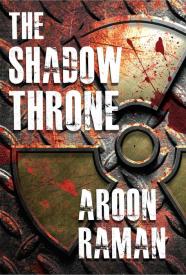 Title: The Shadow Throne
Title: The Shadow ThroneAuthor: Aroon Raman
Publisher: Pan Macmillan
Pages: 332
I just got off a fantastic roller coaster ride. The Shadow Throne by Aroon Raman is a masterful thriller, complete with the twists and turns required to keep you on edge. Reading this book gave me an indication of just how much the Indian thriller, with its own compulsions and context, has grown.
A group of people, rogue elements from the Research and Analysis Wing (RAW), one of India’s many intelligence wings, are willing to go to any lengths, including staging the Shadow Throne, a nuclear strike on Indian and Chinese soil that will re-organise the geo-politics of the Indian sub-continent and more ambitiously, the world. The effort, they know, will cause the West and China, two of its biggest allies, to break off all ties with Pakistan and strip that country of its nuclear arsenal, effectively destroy the enemy. But Pakistan itself has no idea of where, how and when such a catastrophe will be engineered.
It is the murder of a man from an ancient race that provides the clues to the conspiracy. Inspector Syed Ali Hassan seeks the help of freelance journalist Chandrasekhar to understand the mystery behind this strange death and the even more strange murder victim. Just as the case gets interesting, Inspector Hassan is taken off the case by the RAW.
What follows is a deadly game of life and death, as Pakistan seeks their help to prevent this disaster from occurring. Meenakshi Pirzada, a history professor at Delhi University and best friend of Chandra’s dead wife, helps them decode the clues. Very soon, Chandra and Hassan are spirited into Afghanistan to find the location of the nuclear missiles, trace the coordinates of the area being targeted and thereby prevent a sub-continental nuclear holocaust.
It is a dangerous task. Will Hassan and Chandra succeed in saving millions of lives or will they themselves die in their effort to save the world as we know it? And is Hassan what he says he is? Or is he a traitor to the nation?
The writing is masterful and taut, and the research sharp and impressive. Raman’s descriptions of the Bamiyan in Afghanistan are beautiful, and serve to evoke the scene right before your eyes.
The author shows himself to be equally adept at handling the first person point of view of Chandra and the third person omniscient narrator’s point of view on behalf of the other characters in the book.
His description of Meenakshi, Chandra and Hassan helped ground the characters, moor them to earth, in their close similarity to ordinary people, not some fantastical notions of what a romantic hero should look like. Chandra is out of shape and overweight and Meenakshi is petite. The fact that some of them are battling their own demons makes them even more real.
The only false note is sounded by the questionable editing. Sadly there were just too many grammatical and spelling errors, which were annoying.
I also felt that there were some questions that were left unanswered. Despite being told that there was a high-level mole who was aiding the rogues, the identity of the person remains unrevealed.
I also appreciated the fact that Indian words like vetal, and a smattering from Tamil have been snugly given their due in the narrative, without resorting to a translation or even the customary italicisation. That’s a true tribute to Indianness, not having to explain the everydayness of things we take for granted.
Despite being rooted in Indianness, Raman shows a rare finesse when it comes to talking about things that we have so far seen in Western thrillers alone.
Time to say, desi thrillers, Zindabad!
This review is a part of the Book Reviews Program at BlogAdda.com. Participate now to get free books!
The writing is masterful and taut, and the research sharp and impressive. Raman’s descriptions of the Bamiyan in Afghanistan are beautiful, and serve to evoke the scene right before your eyes.
The author shows himself to be equally adept at handling the first person point of view of Chandra and the third person omniscient narrator’s point of view on behalf of the other characters in the book.
His description of Meenakshi, Chandra and Hassan helped ground the characters, moor them to earth, in their close similarity to ordinary people, not some fantastical notions of what a romantic hero should look like. Chandra is out of shape and overweight and Meenakshi is petite. The fact that some of them are battling their own demons makes them even more real.
The only false note is sounded by the questionable editing. Sadly there were just too many grammatical and spelling errors, which were annoying.
I also felt that there were some questions that were left unanswered. Despite being told that there was a high-level mole who was aiding the rogues, the identity of the person remains unrevealed.
I also appreciated the fact that Indian words like vetal, and a smattering from Tamil have been snugly given their due in the narrative, without resorting to a translation or even the customary italicisation. That’s a true tribute to Indianness, not having to explain the everydayness of things we take for granted.
Despite being rooted in Indianness, Raman shows a rare finesse when it comes to talking about things that we have so far seen in Western thrillers alone.
Time to say, desi thrillers, Zindabad!
No comments:
Post a Comment